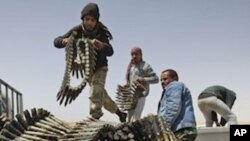Fighting is being reported in at least three Libyan cities Saturday, including the besieged port of Misrata, where living conditions continue to deteriorate. Human rights groups are also accusing Gadhafi loyalists of using cluster bombs in the city.
Desperate residents of the besieged rebel-held city of Misrata express their grief and anguish as the battle for the city continues unabated. Witnesses report shelling and rocket attacks by pro-Gadhafi forces around Misrata port where hundreds of civilians have been hunkering down.
Al Jazeera TV showed images of buildings around the port ablaze, with fire coming out their windows, after an intense rocket barrage. Witnesses say large portions of the city have been abandoned due to the intense shelling and hundreds of families are living in cramped conditions, without running water and electricity.
The group, Human Rights Watch, is also accusing pro-Gadhafi forces of using dangerous cluster bombs, banned by most countries, in Misrata. Human Rights Watch spokesperson Emma Daley says an observer from the group witnessed Gadhafi forces using what she thinks were cluster bombs.
"We actually witnessed what we believe were three cluster munitions strikes a couple of nights ago over a populated neighborhood of Misrata. And, we interviewed a couple of witnesses who believe that they saw cluster munition attacks on earlier occasions. And finally, our researchers in Misrata found physical evidence. They found sub-munitions from cluster munitions that they were able to identify as a Spanish weapon manufactured in 2007," he said.
Libyan government spokesman Moussa Ibrahim, however, denies that Gadhafi forces are using cluster bombs, insisting that it would be foolish to do so, since the evidence would be obvious. "We challenge them to prove this. To use these bombs, you know, the evidence will remain for days and weeks and we know the international community is coming en masse [to] our country soon. So, we can't do this. We can't do anything that would incriminate us, even if we were criminals," he said.
Ashraf Mohammed, an Egyptian man who worked in Misrata and was recently evacuated by sea to the rebel-held city of Benghazi, describes conditions in the city before he left. He said that more than 80 missiles fell on Misrata port, in the 24 hours before he was evacuated from the city. He notes that even more shells fell on the rest of the city, and three Egyptian workers were killed in the attacks.
Mohamed Abu Tunyan, a worker from Bangladesh, explains that the shelling and the lack of food and water made living conditions dire for himself and hundreds of other Bangladeshis. He said he and about 1,500 other Bangladeshi workers were hiding in the Masna steel factory in Misrata for about 15 days. He complains that the shelling on the port area, along with the lack of food and water made living conditions extremely difficult.
Heavy fighting was also reported Saturday around the eastern city of Ajdabiya. Rebel forces have reportedly taken some new ground from Gadhafi loyalists on the road to the oil port of Brega. The fighting comes amid a recent flurry of diplomatic activity, and conferences in Berlin, Cairo, and Doha, Qatar.
Clashes Reported in Several Libyan Cities




